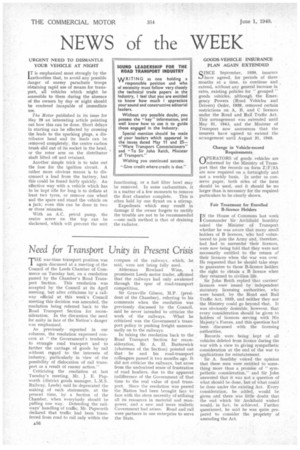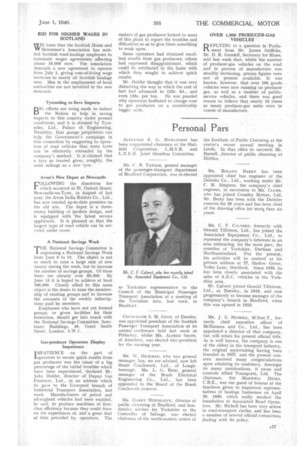NEWS of the WEEK
Page 18

Page 19

If you've noticed an error in this article please click here to report it so we can fix it.
URGENT NEED TO DISMANTLE YOUR VEHICLE AT NIGHT
IT is emphasized most strongly by the authorities that, to avoid any possible danger of enemy parachute troops obtaining rapid use of means for transport, all vehicles which might be accessible to them during the absence of the owners by day or night should be rendered incapable of immediate use.
The Motor published in its issue for May 29 an interesting article pointing out how this can be done. Short delays in starting can be effected by crossing the leads to the sparking plugs, a distributor head and its leads can be removed completely, the centre carbon brush slid out of its socket in the head, or the rotor arm on the distributor shaft lifted off and retained.
Another simple trick is to take out the fuse for the ignition circuit. A rather more obvious means is to disconnect a lead from the battery, but this could be found fairly quickly. An effective way with a vehicle which has to be kept idle for long is to deflate at least two tyres, or remove one wheel and the spare and stand the vehicle on a jack; even this can be done in two
or three' minutes, With an A.C. petrol pump, the centre screw on the top can be slackened, which will prevent the unit
functioning, or a fuel filter bowl may be removed. In some carburetters, it is a matter of a few moments to remove the float chamber complete. This is often held by one flynut on a stirrup.
Expedients which may result in damage if the owner forgets to rectify the trouble are not to be recommended —one such method is that of draining the radiator.
GOODS-VEHICLE INSURANCE PLAN AGAIN EXTENDED
SINCE September, 1939, insurers have agreed, for periods of three months at a time, to continue and extend, without any general increase in rates, existing policies for " grouped " goods vehicles, although the Emergency Powers (Road Vehicles and Drivers) Order, 1939, removed certain restrictions on A, B, and C licences under the Road and Rail Traffic Act. This arrangement was extended until May 31, 194), and the Minister of Transport now announces that the insurers have agreed to extend the arrangement until August 31, 1940.
Change in Vehicle-record Requirements
OPERATORS of goods vehicles are informed by the Ministry of Transport that the records on form Z/Ff5A are now required on a fortnightly and not a weekly basis. In order to conserve paper, both sides of the form should be used, and it should be no larger than is necessary for the required particulars to he clearly shown.
Fair Treatment for Enrolled B-licence Holders I N the House of Commons last week Commander Sir Archibald Southby asked the Minister of Transport whether he was aware that many small holders of B licences, who had volunteered to join the Army and, therefore, had had to surrender their licences, were now being told that they were not necessarily entitled to the return o:c their licences when the war was over. He requested that he should take step2 to guarantee to those B-licence holders the right to obtain a B licence when they returned to civilian life.
Sir John Reith replied that carriers' licences were issued by independent statutory licensing authorities, who were bound, by the Road and Rail Traffic Act, 1933, and neither they nor the Ministry could go beyond that. It was obviously desirable, however, that every consideration should be given to holders of licences serving with His Majesty's Forces, and this question had been discussed with the licensing authorities.
Records were being kept of all vehicles deleted from licence during the war with a view to giving sympathetic consideration at the end of the war to applications for reinstatement_
Sir A. Southby voiced the opinion that these men were entitled to something more than a promise of sympathetic consideration," and Sir John answered that it was not a question of what should be clone, but of what could be done under the existing Act. Every consideration, he added, would be given and there was little doubt that the end which Sir Archibald wished would, in fact, be achieved. Further questioned, he said he was quite prepared to consider the propriety of amending the Act.
BID FOR HIGHER WAGES IN SCOTLAND WJE learn that the Scottish Horse and IN Motormen's Association has notified Scottish road-haulage employers to terminate wages agreements affecting about 10,000 men. The association demands a new agreement to operate from July 1, giving cost-of-living wage increases to nearly all Scottish haulage men. Men in the employment of local authorities are not involved in the new demands.
Tyresoling to Save Imports
BIG efforts are being made to induce the Nation to help in saving imports to this country under present conditions, and it is stressed by Tyresoles, Ltd., Palace of Engineering, Wembley, that garage proprietors can help the Government's campaign in this connection by suggesting to operators of road vehicles that worn tyres can be efficiently retreaded by the company's method. It is claimed that a tyre so treated gives, roughly, the same mileage as a new tyre.
Avon's New Depot at Newcastle TOLLOWING the disastrous fire which occurred at 21, Oxford Street, Newcastle-on-Tyne, in August of last year, the Avon India Rubber Co., Ltd., has now erected up-to-date premises on the old site. The depot is a threestorey building of modern design, and is equipped with the latest service appliances. It is planned so that the largest type of road vehicle can be serviced under cover.
A National Savings Week
rrHE National Savings Committee is 1 organizing a National Savings Week from June 9 to 15. The object is not so much to raise a large sum of new money during the week, but to increase the number of savings groups. Of these there are already over 80,000. By June 15 it is hoped to achieve at least 100,000. Closely allied to this main object is the desire to raise the membership of existing groups and to increase the amounts of the weekly subscriptions paid by members.
Employers who have not yet formed groups, or given facilities for, their formation, should get into touch with the National Savings Committee, Sanctuary Buildings, 20, Great Smith Street, London, S.W.1.
Gas-producer Operators Display Impatience
1IMPATIENCE on the part of operators to secure quick results from gas producers was the cause of a big percentage of the initial troubles which have been experienced, declared Mr. John Holder, director of Dupuy Gas Producer, Ltd., in an address which he gave to the Liverpool branc,h of Industrial Transport Association, last week. Manufacturers of petrol and oil-engined vehicles had been enabled, be said, to produce machines of firstclass efficiency because they could draw on the experiences of, and a great deal of data provided by, operators. The
makeis of gas producers looked to users of this plant to report the troubles and difficulties so as to give them something to wock upon.
Some operators had obtained excellent results from gas producers; others had expressed disappointment, which could be attributed to the haste with which they sought to achieve quick results.
Mr. Holder thought that it was very disturbing the way in which the cost of fuel had advanced to 122s. 6d., and even 130s. per ton. He was puzzled why operators hesitated to change over to gas producers on a considerably bigger scale. OVER 1,900 PRODUCER-GAS VEHICLES
REPLYING to a question in Parliament from Mr. James Griffiths, Mr. D. R. Grenfell, Secretary for Mines, said last week that, whilst the number of producer-gas vehicles on the road and in process of manufacture was steadily increasing, precise figures were not at present available. It was known, however, that over 190 goods .vehicles were now running on producer gas, as well as a number of publicservice vehicles, and there was good reason to believe that nearly 10 times as many producer-gas units were in course of manufacture.




























































